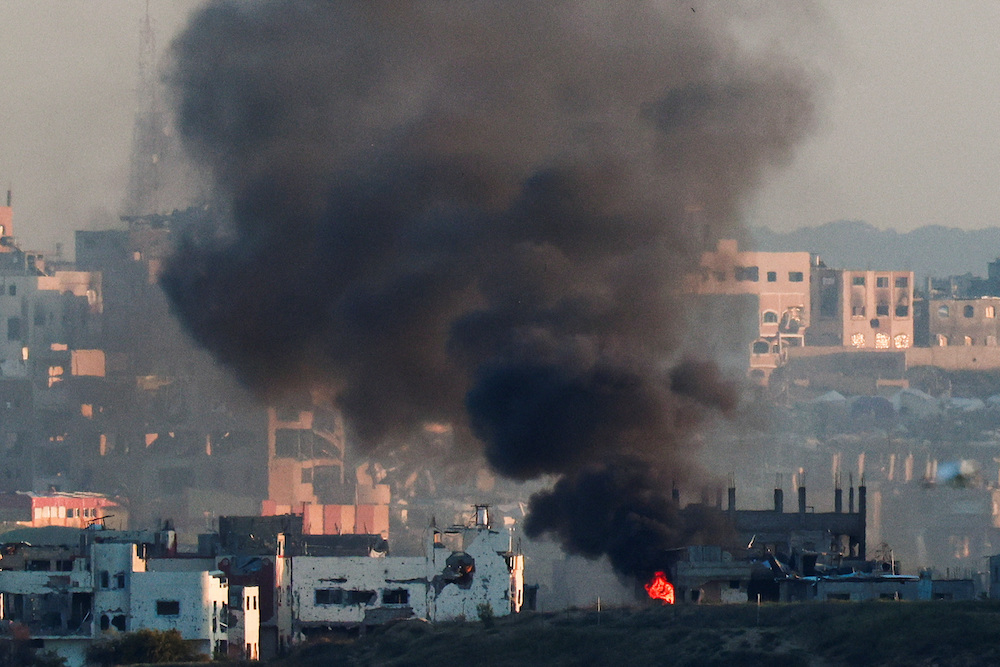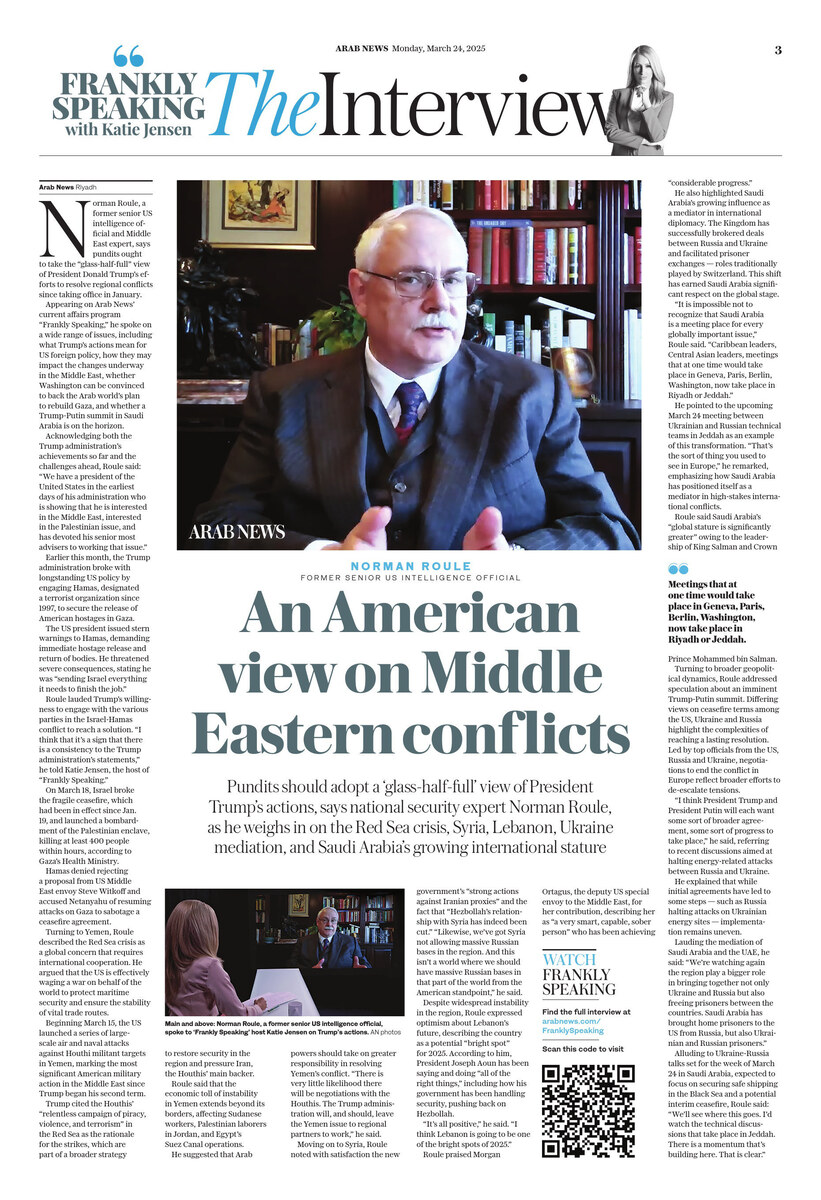RIYADH: Norman Roule, a former senior US intelligence official and Middle East expert, says pundits ought to take the “glass-half-full” view of President Donald Trump’s efforts to resolve regional conflicts since taking office in January.
Appearing on Arab News’ current affairs program “Frankly Speaking,” he spoke on a wide range of issues, including what Trump’s actions mean for US foreign policy, how they may impact the changes underway in the Middle East, whether Washington can be convinced to back the Arab world’s plan to rebuild Gaza, and whether a Trump-Putin summit in Saudi Arabia is on the horizon.
Acknowledging both the Trump administration’s achievements so far and the challenges ahead, Roule said: “We have a president of the United States in the earliest days of his administration who is showing that he is interested in the Middle East, interested in the Palestinian issue, and has devoted his senior most advisers to working that issue. I’m going to take that as a good start.
“The second issue is, he is consulting routinely with regional partners to include Saudi Arabia, and that’s always a wise move. He is also speaking with the Jordanians, the Egyptians, and that’s also a smart step.”
Reinforcing the “glass-half-full” argument, Roule said: “We have multiple Arab countries who are showing wise and consistent leadership and are focusing resources and political attention on the political and humanitarian future of the Palestinian people. That should be applauded and it should be endorsed and it deserves international applause and resources.”

Norman Roule, a former senior US intelligence official, spoke to “Frankly Speaking” host Katie Jensen on the possible impact of President Trump’s actions in the Middle East among a number of other topics. (AN Photo)
Earlier this month, the Trump administration broke with longstanding US policy by engaging Hamas, designated a terrorist organization since 1997, to secure the release of American hostages in Gaza.
The US president issued stern warnings to Hamas, demanding immediate hostage release and return of bodies. He threatened severe consequences, stating he was “sending Israel everything it needs to finish the job.”
Roule lauded Trump’s willingness to engage with the various parties in the Israel-Hamas conflict to reach a solution. “I think that it’s a sign that there is a consistency to the Trump administration’s statements,” he told Katie Jensen, the host of “Frankly Speaking.”
“The administration stated as follows: We will speak with anybody for a diplomatic arrangement. We won’t speak endlessly. We will look for alternatives such as moving people to other countries, offering an extension of a ceasefire, doing what’s necessary. We want hostages back. We want peace. We will see where this leads, but we’re not going to tolerate endless, endless violence and endless militancy.”
On March 18, Israel broke the fragile ceasefire, which had been in effect since Jan. 19, and launched a bombardment of the Palestinian enclave, killing at least 400 people within hours, according to Gaza’s health ministry.
Israeli Prime Minister Benjamin Netanyahu accused Hamas of repeatedly refusing to release the remaining 59 hostages — 24 of whom are believed to be alive — taken on Oct. 7, 2023, during a deadly attack in southern Israel that prompted Israel's widescale bombing campaign in Gaza.
Hamas denied rejecting a proposal from US Middle East envoy Steve Witkoff and accused Netanyahu of resuming attacks on Gaza to sabotage a ceasefire agreement.
“The challenges that the president and Steve Witkoff have looked at the scale of the devastation in Gaza, and it is extraordinary,” Roule said. “And truth be told, there has never been a reconstruction in the history of the world where 1.5 million people, which include thousands of militant armed gunmen, have stayed in place while reconstruction has occurred.
“It’s just never happened. And their position is these people need to be moved to a place where they can have normal lives while that reconstruction takes place.”
When asked if Netanyahu would dare defy the US president the way he did when Joe Biden and Barack Obama were in office, Roule pointed out that over more than four decades, Israeli politics and Israeli relations with the US “have been complicated.” “We’ve had periods where Israeli leaders who have had very close relations with Washington have had very difficult relations and periods of defiance with Washington,” he said.
“And we’ve also had periods where American presidents who have vowed the strongest support of Israel have cut off financial support and weapons support for Israel out of anger over Israeli actions. … There is turbulence almost inevitably as part of our US-Israeli relationship.”

Smoke rises from a burning building in North Gaza, as seen from the Israel-Gaza border, March 23, 2025. (Reuters)
Turning to Yemen, Roule described the Red Sea crisis as a global concern that requires international cooperation. He argued that the US is effectively waging a war on behalf of the world to protect maritime security and ensure the stability of vital trade routes.
Beginning March 15, the US launched a series of large-scale air and naval attacks against Houthi militant targets in Yemen, marking the most significant American military action in the Middle East since Trump began his second term.
Trump cited the Houthis’ “relentless campaign of piracy, violence, and terrorism” in the Red Sea as the rationale for the strikes, which are part of a broader strategy to restore security in the region and pressure Iran, the Houthis’ main backer.
Since November 2023, the Houthis have launched over 100 attacks on ships in the Red Sea and surrounding waters, claiming they were aimed at supporting Palestinians in Gaza. Targets have included commercial vessels, warships, and Israel-linked ships.
“There are now more than 14 Iranian missile systems being operated in Yemen and more than a dozen, approximately a dozen, drone systems operating from Yemen as well,” Roule said.
He added: “Now that logistics system has been cut because of the naval presence in the area, but Iran can restore this at any time and interdict global trade and indeed provide capabilities that extend that introduction into the Indian Ocean and have greater impact on the world's economy.
“The US is saying that is over. And that means that Iranian Quds Force personnel in Yemen … are now at risk if they are standing near Houthi ballistic missiles, explosive boats or offensive drone systems.”
Roule said that the economic toll of instability in Yemen extends beyond its borders, affecting Sudanese workers, Palestinian laborers in Jordan, and Egypt’s Suez Canal operations.
“We have some significant regional impact,” he said. “Egypt has lost $7 billion in 2024. Palestinian workers in Jordan who take care of thousands of containers of shipping have been unemployed. Sudanese humanitarian aid has been severely diminished because of Red Sea activity.”
When asked about the cost-effectiveness of using advanced fighter jets flying from Qatar and Bahrain against primitive weapons deployed by Yemeni forces, Roule emphasized the need to balance financial considerations with strategic objectives. “This is a serious freedom of navigation issue that does have economic and political consequences and the US playing its role in part because we’re the only world actor with naval capabilities that can do this,” he said.

Beginning March 15, the US launched a series of large-scale air and naval attacks against Houthi militant targets in Yemen. (X/@CENTCOM/Reuters)
“Europe doesn’t have the same level of ships with anti-missile capabilities as the United States. We’ve got to do what we are capable of doing.”
Offering his cost-benefit analysis of the decision to counter Houthi attacks, Roule said: “Sometimes people say it’s a $4 million missile bringing down a $100,000 drone, that’s true. But the actual way of looking at that is, it’s a $4 million missile preventing a $100,000 drone from hitting a $1 billion ship.”
Roule also suggested that Arab powers should take on greater responsibility in resolving Yemen’s conflict. “There is very little likelihood there will be negotiations with the Houthis. The Trump administration will, and should, leave the Yemen issue to regional partners to work,” he said, stressing that it is “a regional issue, not an American issue.”
Moving on to Syria, Roule noted with satisfaction the new government’s “strong actions against Iranian proxies” and the fact that “Hezbollah’s relationship with Syria has indeed been cut.” “Likewise, we’ve got Syria not allowing massive Russian bases in the region. And this isn’t a world where we should have massive Russian bases in that part of the world from the American standpoint,” he said.
“We have seen some very promising developments between the Syrian Democratic Forces, how Kurds are handled between the new Syrian government and the Kurds. And in some ways, this is again where Saudi diplomats, where Arab diplomats, where Syrian diplomats, need to push this case with Congress, with the American media. … The challenge remains.”
Does Roule think that the sanctions, which were imposed essentially on the Bashar Assad regime, should be lifted?
“The answer is yes, but at the same time, the new regime, which is led by people with dark backgrounds, needs to prove itself,” he said. “It is attempting to do so. It is not a monolith in terms of its organization or its structure.”
Asked how a local solution, even if it is from Arab governments, can be found if US sanctions remain in place, he said: “Sanctions waivers should be provided, should be watched carefully across the board.
“Syrians should be encouraged to come home and provide it with financial relief so that they can return with resources to start businesses, to enable their families to thrive and build communities. And the West can be part of that. And your show and other voices should be encouraging that.”
Roule reiterated his point that regional actors ought to play a more prominent role in Syria’s conflict resolution. “This is an Arab issue,” he said. “This is an example where we’ve watched Saudi Arabia and others, but Saudi Arabia, since we’re speaking about the Kingdom, play an important and profound role in shaping regional events.”
He emphasized that the US and the West “need not to lead what happens with Syria, but to partner and to follow behind the leadership of the Kingdom so that we are enabling the region to, in essence, build itself.”
“Now, we can help, the United States can help in making sure Israel doesn't complicate things,” he said. “We can help and make sure that Western banks help Syria as needed.”
Despite widespread instability in the region, Roule expressed optimism about Lebanon’s future, describing the country as a potential “bright spot” for 2025. According to him, President Joseph Aoun has been saying and doing “all of the right things,” including how his government has been handling security, pushing back on Hezbollah, and “preventing Iran from bringing in cash.”
“It’s all positive,” he said. “I think Lebanon is going to be one of the bright spots of 2025.”
Roule praised Morgan Ortagus, the deputy US special envoy to the Middle East, for her contribution, describing her as “a very smart, capable, sober person” who has been achieving “considerable progress.”
Ortagus’ involvement in Lebanon has centered on addressing the aftermath of the Israel-Hezbollah conflict — which started on Oct. 8, 2023, and escalated since September 2024 — and on fostering regional stability.
“She’s tireless in her focus on bringing Lebanon to the attention of policymakers and making sure that they get what they need from Congress and elsewhere,” he said.

Appearing on Arab News’ current affairs program “Frankly Speaking,” Roule spoke on a wide range of issues, including what Trump’s actions mean for US foreign policy, how they may impact the changes underway in the Middle East. (AN Photo)
Roule also highlighted Saudi Arabia’s growing influence as a mediator in international diplomacy. The Kingdom has successfully brokered deals between Russia and Ukraine and facilitated prisoner exchanges — roles traditionally played by Switzerland or European nations. This shift has earned Saudi Arabia significant respect on the global stage.
According to him, Saudi Arabia’s stature in the international community “has dramatically changed in recent years.”
“It is impossible not to recognize that Saudi Arabia is a meeting place for every globally important issue,” Roule said. “Caribbean leaders, Central Asian leaders, meetings that at one time would take place in Geneva, Paris, Berlin, Washington, now take place in Riyadh or Jeddah.”
He pointed to the upcoming March 24 meeting between Ukrainian and Russian technical teams in Jeddah as an example of this transformation. “That’s the sort of thing you used to see in Europe,” he remarked, emphasizing how Saudi Arabia has positioned itself as a mediator in high-stakes international conflicts.
Roule said Saudi Arabia’s “global stature is significantly greater” owing to the leadership of King Salman and Crown Prince Mohammed bin Salman. Once viewed, both regionally and globally, primarily through the lens of Islam or energy, Saudi Arabia now plays a bigger role in shaping international events, he said.
Turning to broader geopolitical dynamics, Roule addressed speculation about an imminent Trump-Putin summit. Differing views on ceasefire terms among the US, Ukraine and Russia highlight the complexities of reaching a lasting resolution. Led by top officials from the US, Russia and Ukraine, negotiations to end the conflict in Europe reflect broader efforts to de-escalate tensions.
Despite recent agreements, including Russia’s temporary halt on strikes against Ukrainian energy infrastructure, challenges remain. While acknowledging the momentum toward such a meeting, Roule cautioned that unresolved issues must be addressed first.
“I think President Trump and President Putin will each want some sort of broader agreement, some sort of progress to take place,” he said, referring to recent discussions aimed at halting energy-related attacks between Russia and Ukraine.
He explained that while initial agreements have led to some steps — such as Russia halting attacks on Ukrainian energy sites — implementation remains uneven. Pointing to reports of Russian drone strikes during negotiations, he noted that Russia claimed to have recalled or intercepted its own drones to prevent further escalation.
Lauding the mediation of Saudi Arabia and the UAE, he said: “We’re watching again the region play a bigger role in bringing together not only Ukraine and Russia but also freeing prisoners between the countries. Saudi Arabia has brought home prisoners to the US from Russia, but also Ukrainian and Russian prisoners.
“Riyadh has done a number of remarkable things. We need we need a broader set of agreements to take place. Steve Witkoff and a number of Russian advisers, I believe, are in quiet communications behind the scenes. This is going to need to percolate for a while.”
Alluding to Ukraine-Russia talks set for the week of March 24 in Saudi Arabia, expected to focus on securing safe shipping in the Black Sea and a potential interim ceasefire, Roule said: “We’ll see where this goes. I’d watch the technical discussions that take place in Jeddah. There is a momentum that’s building here. That is clear.”





























